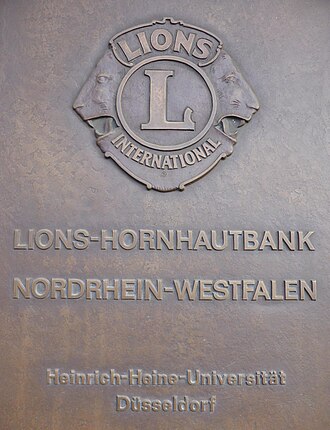Lions Eye Bank


Lions Eye Bank is a non-profit organization dedicated to the collection, processing, and distribution of corneal tissue for corneal transplantation. These banks play a crucial role in restoring sight to individuals suffering from corneal blindness through corneal transplantation. The Lions Eye Banks are often affiliated with the Lions Clubs International, a global service club organization known for its commitment to community service and vision care.
History[edit]
The concept of eye banking began to gain traction in the mid-20th century, with the establishment of the first eye banks. The Lions Clubs International, recognizing the profound impact of corneal transplantation on individuals' lives, began to support and establish Lions Eye Banks around the world. These banks have since become integral in the fight against blindness, adhering to the Lions' motto "We Serve" by providing the gift of sight.
Function[edit]
The primary function of a Lions Eye Bank is to facilitate the donation and transplantation of corneal tissue. This process involves several key steps:
- Donor Screening: Potential donors are screened to ensure that their corneas are suitable for transplantation. This includes a review of medical and social history to reduce the risk of transmitting diseases.
- Tissue Recovery: Once a donor is deemed suitable, corneal tissue is surgically removed by trained professionals, often within hours of the donor's death.
- Tissue Processing: The corneal tissue is then processed and evaluated in a laboratory setting to ensure its viability and safety for transplantation.
- Distribution: Once processed and deemed suitable, the corneal tissue is distributed to surgeons who perform the corneal transplants on patients in need.
Impact[edit]
The impact of Lions Eye Banks is profound, with thousands of individuals regaining their sight each year thanks to corneal transplants. This not only improves the quality of life for those individuals but also has a ripple effect on their families and communities. The work of Lions Eye Banks, supported by volunteers and donations, exemplifies the power of community service in addressing global health challenges.
Challenges[edit]
Despite their success, Lions Eye Banks face several challenges, including:
- Increasing the number of eye donors to meet the growing demand for corneal transplants.
- Navigating complex regulatory environments to ensure the safe and ethical procurement and distribution of corneal tissue.
- Adapting to advances in medical technology and transplantation techniques to improve outcomes for recipients.
Future Directions[edit]
The future of Lions Eye Banks includes embracing new technologies in corneal preservation and transplantation, expanding global outreach to address corneal blindness worldwide, and continuing to raise awareness about the importance of eye donation.
Ad. Transform your life with W8MD's Budget GLP-1 injections from $49.99


W8MD offers a medical weight loss program to lose weight in Philadelphia. Our physician-supervised medical weight loss provides:
- Weight loss injections in NYC (generic and brand names):
- Zepbound / Mounjaro, Wegovy / Ozempic, Saxenda
- Most insurances accepted or discounted self-pay rates. We will obtain insurance prior authorizations if needed.
- Generic GLP1 weight loss injections from $49.99 for the starting dose of Semaglutide and $65.00 for Tirzepatide.
- Also offer prescription weight loss medications including Phentermine, Qsymia, Diethylpropion, Contrave etc.
NYC weight loss doctor appointmentsNYC weight loss doctor appointments
Start your NYC weight loss journey today at our NYC medical weight loss and Philadelphia medical weight loss clinics.
- Call 718-946-5500 to lose weight in NYC or for medical weight loss in Philadelphia 215-676-2334.
- Tags:NYC medical weight loss, Philadelphia lose weight Zepbound NYC, Budget GLP1 weight loss injections, Wegovy Philadelphia, Wegovy NYC, Philadelphia medical weight loss, Brookly weight loss and Wegovy NYC
|
WikiMD's Wellness Encyclopedia |
| Let Food Be Thy Medicine Medicine Thy Food - Hippocrates |
Medical Disclaimer: WikiMD is not a substitute for professional medical advice. The information on WikiMD is provided as an information resource only, may be incorrect, outdated or misleading, and is not to be used or relied on for any diagnostic or treatment purposes. Please consult your health care provider before making any healthcare decisions or for guidance about a specific medical condition. WikiMD expressly disclaims responsibility, and shall have no liability, for any damages, loss, injury, or liability whatsoever suffered as a result of your reliance on the information contained in this site. By visiting this site you agree to the foregoing terms and conditions, which may from time to time be changed or supplemented by WikiMD. If you do not agree to the foregoing terms and conditions, you should not enter or use this site. See full disclaimer.
Credits:Most images are courtesy of Wikimedia commons, and templates, categories Wikipedia, licensed under CC BY SA or similar.
Translate this page: - East Asian
中文,
日本,
한국어,
South Asian
हिन्दी,
தமிழ்,
తెలుగు,
Urdu,
ಕನ್ನಡ,
Southeast Asian
Indonesian,
Vietnamese,
Thai,
မြန်မာဘာသာ,
বাংলা
European
español,
Deutsch,
français,
Greek,
português do Brasil,
polski,
română,
русский,
Nederlands,
norsk,
svenska,
suomi,
Italian
Middle Eastern & African
عربى,
Turkish,
Persian,
Hebrew,
Afrikaans,
isiZulu,
Kiswahili,
Other
Bulgarian,
Hungarian,
Czech,
Swedish,
മലയാളം,
मराठी,
ਪੰਜਾਬੀ,
ગુજરાતી,
Portuguese,
Ukrainian
